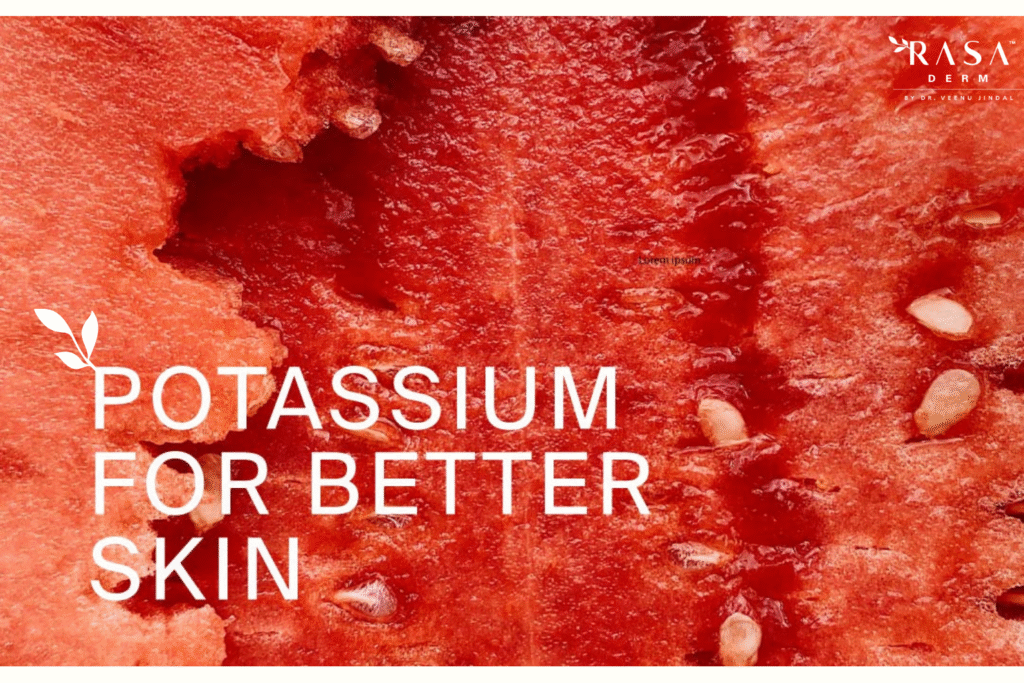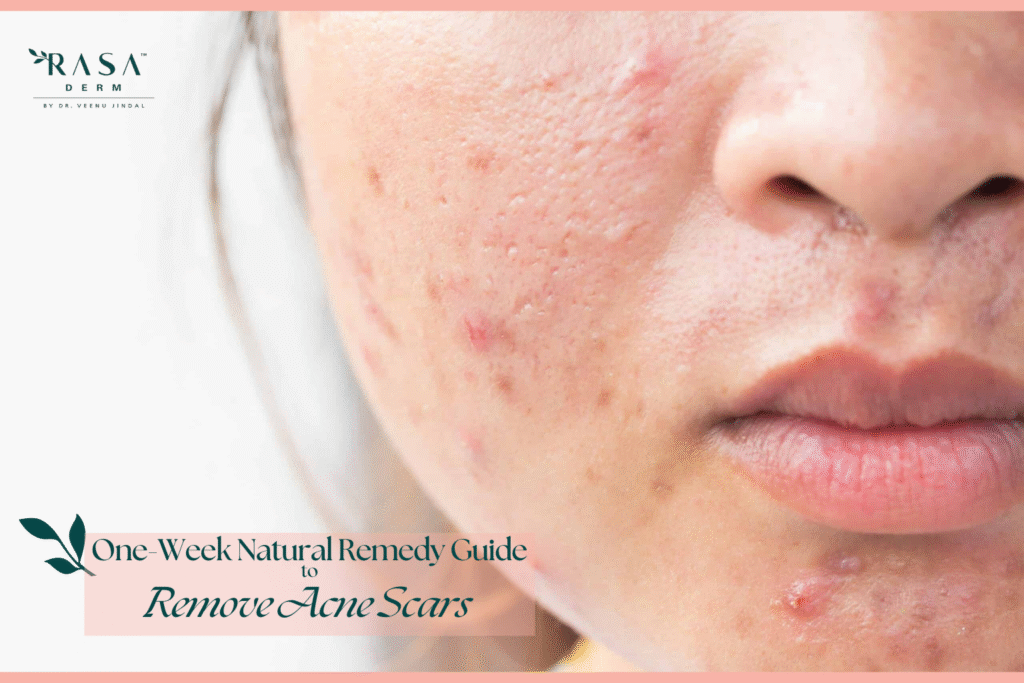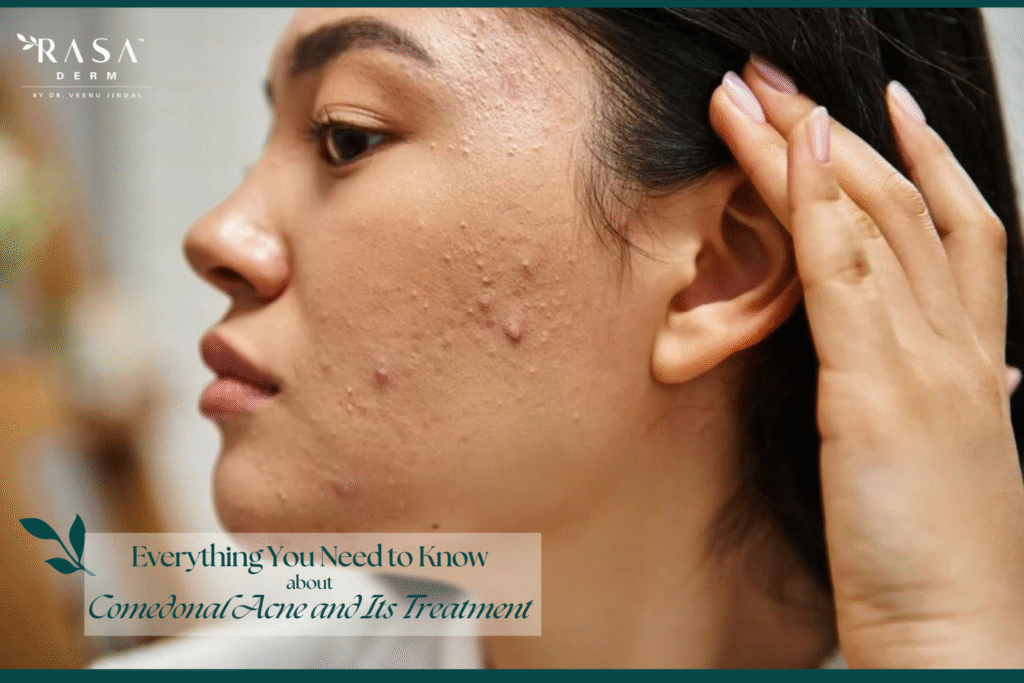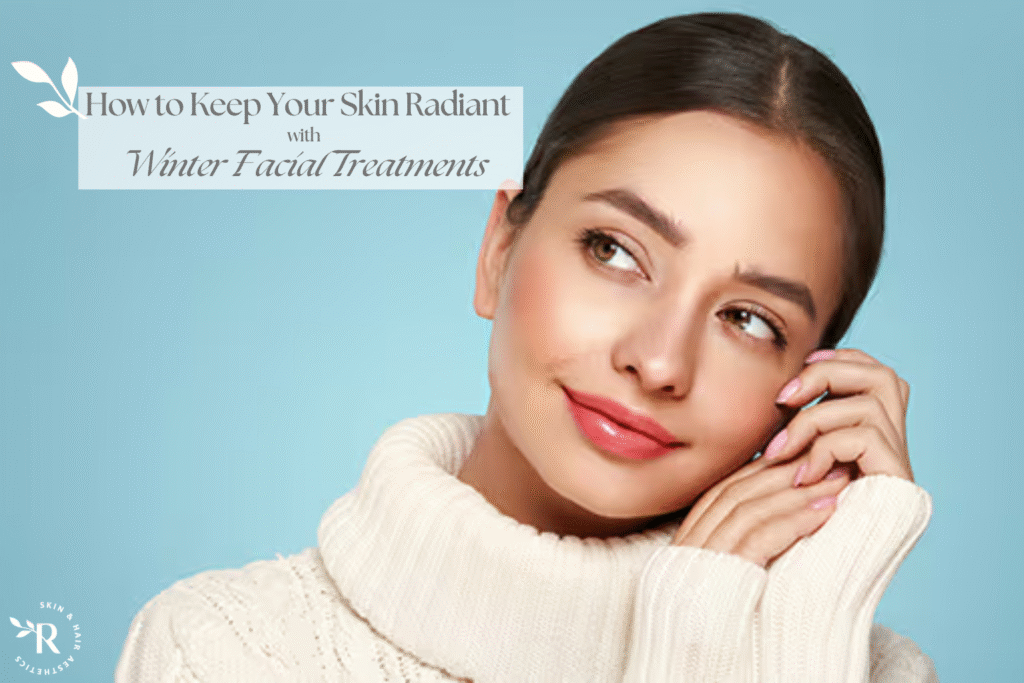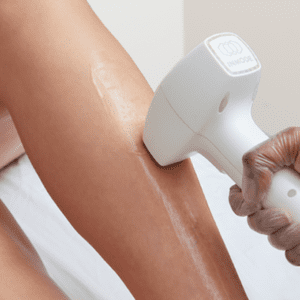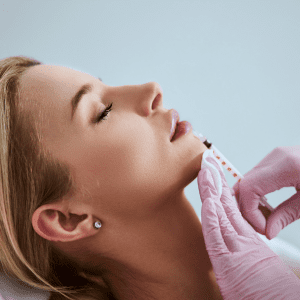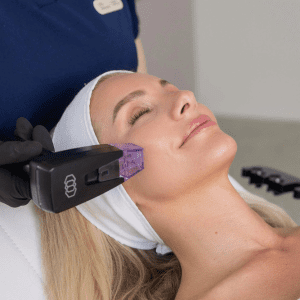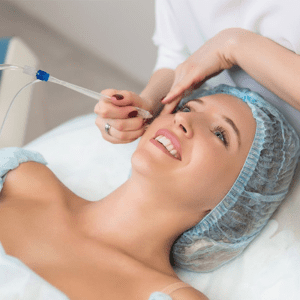Hyperpigmentation is a prevalent skin condition that is distinguished by the presence of dark regions on the skin. While these regions are typically benign, they can have a negative impact on an individual’s self-esteem and confidence. They are the consequence of excessive melanin production. Selecting the most effective hyperpigmentation treatment can be a daunting task due to the abundance of available options. Our objective at Rasa Derm is to assist you in making an informed decision by demystifying hyperpigmentation treatments, under the expert guidance of Dr. Veenu Jindal.
Comprehending Hyperpigmentation
It is imperative to comprehend the diverse varieties and causes of hyperpigmentation prior to exploring the most effective treatments. Hyperpigmentation can be categorized into three primary categories:
- Melasma: Melasma is a condition that frequently results from hormonal changes, such as pregnancy or birth control medications. It is characterized by the presence of dark, symmetrical patches on the face.
- Post-Inflammatory Hyperpigmentation (PIH): This phenomenon arises as a result of an injury or inflammation to the skin, such as cuts, eczema, or acne.
- Sunspots (Solar Lentigines): Age spots, which are also referred to as age spots, are typically observed on areas that are exposed to the sun, such as the face and hands. They are the result of protracted exposure to ultraviolet (UV) rays.
The initial step in selecting the most effective treatment is to determine the form of hyperpigmentation you have.
Factors to Take into Account When Selecting Hyperpigmentation Treatments
In order to guarantee safety and efficacy, it is imperative to evaluate numerous variables when selecting a treatment for hyperpigmentation. These consist of:
- Skin Type: Treatments are administered to various skin types in a manner that is specific to each skin type. For example, individuals with darker skin tones may be more susceptible to hyperpigmentation as a result of specific treatments.
- Cause of Hyperpigmentation: The treatment will be more effective if it is determined that the hyperpigmentation is the result of hormonal changes, skin injuries, or sun exposure.
- Severity of Condition: The necessity of a topical treatment or a more extensive procedure will be determined by the extent and severity of the hyperpigmentation.
- Personal Preferences: While some individuals favor non-invasive remedies, others may prefer the expedited results of medical procedures.
- Expert Advice: Consulting with a dermatologist such as Dr. Veenu Jindal can offer customized recommendations that are tailored to your specific skin requirements.
The Most Effective Treatments for Hyperpigmentation
There are numerous hyperpigmentation treatments, including sophisticated dermatological procedures and topical creams. The following are some of the most effective hyperpigmentation treatments:
- Topical Treatments
Topical remedies are frequently the initial line of defense against hyperpigmentation. Active ingredients that are recognized for their skin-lightening capabilities are present in both over-the-counter and prescription cosmetics.
- Hydroquinone: Hydroquinone is a highly effective treatment for hyperpigmentation, as it inhibits the production of melanin. It is accessible in both over-the-counter and prescription dosages.
- Retinoids: Retinoids, which are derived from vitamin A, are known to promote cell turnover and can assist in the gradual fading of dark blotches. Their formulations are accessible in both prescription and over-the-counter forms.
- Vitamin C: This potent antioxidant not only enhances the skin but also safeguards it from additional UV damage. Vitamin C serums are a prevalent treatment option for hyperpigmentation.
- Niacinamide: Also referred to as vitamin B3, niacinamide has anti-inflammatory properties and inhibits the transfer of melanin to the skin’s surface.
- Kojic Acid: Kojic acid is a popular ingredient in hyperpigmentation cosmetic products, as it is derived from fungi. It impedes the enzyme that is responsible for the production of melanin.
- Chemical Peels
Chemical peels entail the application of a solution to the skin, which induces the top layer to peel off, revealing a more consistently toned, fresher skin beneath. There are various varieties of chemical peels, each with its own level of potency.
- Superficial Peels: These procedures exfoliate the exterior layer of the skin by employing mild acids, such as alpha-hydroxy acids (AHAs). They are appropriate for moderate hyperpigmentation.
- Medium Peels: These peels are effective for moderate hyperpigmentation due to the deeper penetration of harsher acids such as trichloroacetic acid (TCA).
- Deep Peels: These are capable of treating severe hyperpigmentation and employ potent acids such as phenol. Nevertheless, they necessitate extended recuperation periods and should be administered by dermatologists with extensive experience.
- Laser Treatments
Laser treatments are exceedingly effective in eliminating hyperpigmentation. Melanin deposits in the epidermis are targeted and degraded by these agents. There are a variety of laser treatments, such as:
- Fractional Laser: This laser stimulates collagen production and skin renewal by focusing on specific areas of the epidermis. It is effective in the treatment of sunspots and melasma.
- Q-Switched Laser: This laser is particularly effective for treating deeper pigmentation and is frequently employed to remove tattoos and hyperpigmentation.
- Intense Pulsed Light (IPL): IPL, despite not being a laser, is capable of treating a variety of pigmentation issues by utilizing light energy to target pigmented cells.
- Dermabrasion and Microdermabrasion
Dermabrasion and microdermabrasion are both exfoliating procedures that enhance the texture and tone of the skin.
- Microdermabrasion: Uses a diamond-tipped device or fine crystals to exfoliate the outer layer of skin in a non-invasive manner. It is appropriate for modest-to-moderate hyperpigmentation.
- Dermabrasion: This more extensive procedure entails the use of a rotating instrument to eliminate the deeper layers of skin. It is effective for more severe hyperpigmentation; however, it necessitates a prolonged recovery period.
- Microneedling
The process of microneedling entails the use of fine needles to induce micro-injuries in the skin, thereby increasing the absorption of topical treatments and stimulating collagen production. It is effective in the treatment of post-inflammatory hyperpigmentation and in the enhancement of overall skin texture.
Selecting the Right Treatment for Your Needs
When selecting the optimal treatment for hyperpigmentation, it is important to take into account your skin type, the origin and severity of your hyperpigmentation, and your personal preferences. The following is a comprehensive guide that will assist you in making an informed decision:
Step 1: Consult with a dermatologist
It is imperative to consult with a dermatologist, such as Dr. Veenu Jindal at Rasa Derm, prior to initiating any treatment. A professional evaluation will assist in identifying the cause of your hyperpigmentation and the most suitable treatment options.
Step 2: Comprehend Your Skin Type
Understanding your skin type will enable you to select treatments that are both safe and effective. For instance, individuals with sensitive skin may require contraindications to specific laser treatments or chemical peels.
Step 3: Assessment of Treatment Alternatives
Evaluate the advantages and disadvantages of various treatments, such as anticipated outcomes, potential adverse effects, and delay. For example, laser treatments may provide more rapid results; however, they may also be associated with a greater risk of adverse effects than topical treatments.
Step 4: Evaluate Combination Treatments
A combination of treatments may be the most effective approach in numerous instances. For instance, the efficacy of topical treatments can be improved by combining them with chemical peels or microneedling.
Step 5: Adhere to a Consistent Skincare Routine
It is imperative to adhere to a consistent hygiene regimen in order to prevent additional hyperpigmentation, irrespective of the treatment you select. This encompasses the daily application of broad-spectrum sunscreen, as hyperpigmentation can be exacerbated by UV exposure.
Maintenance and Prevention
Preventing hyperpigmentation is as critical as treating it. To prevent future pigmentation issues and maintain an even skin tone, consider the following recommendations:
- Sun Protection: Apply a broad-spectrum sunscreen with an SPF of at least 30 to your skin on a daily basis, regardless of the weather. If you are outdoors, reapply the product every two hours.
- Refrain from Picking at the Skin: Post-inflammatory hyperpigmentation can result from picking at acne or other skin conditions.
- Use Gentle Skincare Products: Harsh products can exacerbate pigmentation and aggravate the skin. Choose products that are fragrance-free and delicate.
- Incorporate antioxidants: Products that contain antioxidants, such as vitamin C and E, can assist in the protection of the skin from environmental harm and the reduction of pigmentation.
Conclusion
Careful consideration of a variety of factors, such as your skin type, the cause of your pigmentation, and your personal preferences, is necessary to select the most effective treatment for hyperpigmentation. Dr. Veenu Jindal at Rasa Derm is committed to providing personalized treatment plans that will assist you in achieving a more even-toned, clearer complexion. The key to success is a consistent hygiene routine and professional guidance, regardless of whether you choose topical treatments, chemical peels, laser therapy, or natural remedies.
Schedule a consultation with Dr. Veenu Jindal at Rasa Derm if you are prepared to advance in the treatment of your hyperpigmentation. We are here to assist you in revealing the natural radiance of your epidermis and enhancing your self-assurance.
Contact us directly or visit our website for additional information on hyperpigmentation treatments and to schedule an appointment. This is the beginning of your journey to achieve a flawless complexion.



